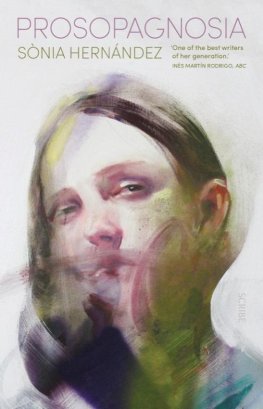Snia Hernndez
PROSOPAGNOSIA

Berta says that beautiful things arent made for her, or that she isnt destined to have them, or that the only things she deserves are ugly. Scientific studies have shown that memory is constructed the same way a story is put together: sentences impose order on a series of images, experiences, and feelings to create a plot. And memory is fundamental to the creation of identity. Berta insists that she cannot have anything beautiful, nor can anything beautiful happen to her. Because she has already passed judgement on her life, she is able to understand her reality in precisely those terms.
Berta is fifteen years old. A few months ago, she bought clippers, which she used to shave off practically all her hair. She says that this way, its easier to imagine the skull hidden beneath her stubbly scalp. Its the only part of her body that she exhibits with anything like pleasure, and not exactly because she likes it, or is proud of it. She feels a deep sense of aversion for her whole body, in fact, which is why she hides it under baggy jeans and woollen jumpers. Its difficult to imagine a teenage body under there.
Sometimes she locks herself in the bathroom and stares fixedly at her own reflection in the mirror. This is one of the main ways she spends her time. Despite how this may seem, she doesnt do it in order to recognise herself, nor is she poring over every inch of her skin in search of some clue that would reveal bodily signs of life. Quite the opposite. She stands in front of the mirror, forcing herself not to blink until her eyes see only an image in which it is impossible to discern the necessary harmony or balance to compose a face.
One of her teachers explained, in class, an illness called prosopagnosia, which is the inability to recognise faces. Berta feels an uncanny sense of satisfaction when she arrives at the point where she no longer recognises her reflection in the mirror. Through this dissociation, she manages to see herself from the outside, as if she were a different person, but without a body. Someone observing a mass of matter without meaning or purpose.
The teacher in question was supposed to be giving an introductory class on psychology, and he thought he would capture the students attention by beginning with perception and all the illusions the human brain is capable of creating. He spent a good number of hours drawing cubes on the blackboard, which he then used to demonstrate the mutability of a geometric figure that in the first dimension was just a square. But depending on how you looked at it, it seemed able to pass into the second dimension. By the same token, sometimes the cube seemed to be angled to the left, while at others times it was angled to the right. Even though it was the very same figure, depending on the perspective, you could view the cube either from above or from below.
Just as the teacher had hoped, the students were fascinated by the class. Berta was fascinated too, because she liked the idea that the forms we perceive as perfect can be broken down into less harmonious forms, if we are able to banish from our brains the received notions that tell us how we should interpret the final object. In some ways, the teachers scientific reasoning proved her right, because if reality isnt manipulated during the process of perception by the words that adults force us to learn, it is, as a consequence, always less balanced and empty of meaning.
One day she was on the cusp of passing out in the bathroom while she stared at herself in the mirror. She held her eyes open as wide as she could, in order to see from behind them, to see directly with her brain. Without realising it, shed stopped breathing, and she only began to do so again when she noticed the first signs of fainting. But those instincts didnt kick in the next time, when she was in the entrance hall of her high school. She would have hit her head hard against the floor or the wall if it hadnt been for a stranger who happened to be standing nearby at the moment she passed out. This time it hadnt happened in the bathroom, but right in front of the receptionists desk by the schools entrance. Someone had left a large painting leaning against the wall; its entire surface was covered in colourful geometric combinations that created different visual effects with depth and perspective. There were stairways made of different colours where it was impossible to tell if the stairs went up or down. Perhaps they werent stairs at all, but buildings wedged close together, sharing walls. Straightaway, Berta thought of the cube her psychology teacher had drawn on the blackboard. She stopped in front of the painting and tried to distinguish the different levels of overlapping figures and the variable depths in the canvas. She probably also stopped breathing.
She came to surrounded by teachers, the receptionist, and (although she couldnt have known in that moment) the man who had caught her at just the right moment and stopped her from bashing her head. Berta didnt want them to call her mother, and in the end they all agreed that it was nothing more than a dizzy spell. The man, whom Berta had never met before, offered to walk her home, because he lived nearby. Once again, the teachers and the receptionist agreed that this was the best course of action.
Along the way, the man told her that he had been watching her while she was staring at the painting. She was feeling rather ashamed about everything that had happened and for the fuss she had caused at school. Luckily, it had occurred at a time when there was barely anyone around. But the man made her feel protected and ashamed in equal measures, perhaps because it had already been made clear to her that she ought to be grateful to him. The man gave off a metallic smell. He wasnt much taller than her, with a pointed, greying beard. She felt so uncomfortable that she even began to regret not letting the teachers call her mother. Awkward things always happened to her.
Do you like the painting? Was there something in particular that you were looking at with such concentration?
She didnt feel like talking with this man at all, but the silence was even more unbearable.
I dont know.
If you like it, its yours.
The old mans comment made Berta laugh. She broke out in a nervous laughter that embarrassed her even more, because she didnt know exactly what she was laughing about. While they walked, she listened to the mans breathing. She wanted to get home as soon as possible. She told him he didnt need to accompany her, that for some time now she had made her own way to and from school, and that she was in a hurry. But he just told her that he would feel better, having witnessed her fainting spell, if he saw her arrive home safe and sound. He spoke in a low, calm voice, with a peculiar accent that Berta couldnt identify. He told her that if she preferred, they didnt have to speak, or even walk together. He would walk a few steps behind her, close enough to make sure that everything was okay, but not so close that it would bother her. Berta didnt say no, but she didnt feel any better either when the man fell back a few paces for the last stretch before she arrived home. He didnt stand next to her even when she stopped at the traffic lights, and yet Berta knew that he was right there behind her. She didnt even turn around when she reached the front door to her building. In fear, she opened the door, went in, and ran up the stairs to her apartment as quickly as she could.
The next morning, the painting was no longer leaning against the wall in the entrance hall of the high school. Berta didnt want to explain what had happened the day before to Lucas or Mario, and she hoped that none of the teachers who had been there would be so indiscreet as to mention it in front of anyone else. Luckily, they didnt. Even the principal failed to mention it as she came by Bertas desk to drop off a maroon-coloured envelope that Berta left unopened until she arrived home. Shortly after she went through the doors of the high school, standing by a traffic light on a nearby corner she saw the man who had accompanied her yesterday after her dizzy spell. Although their eyes met, neither one of them greeted the other.










